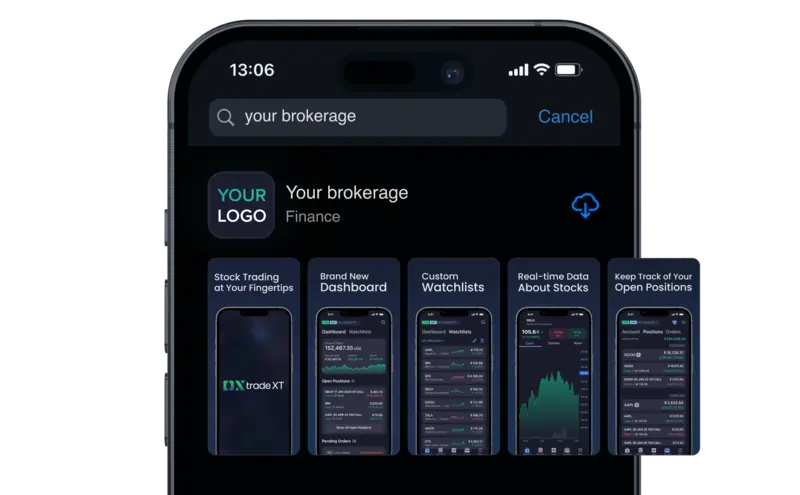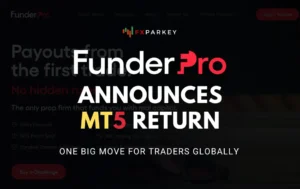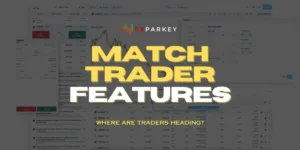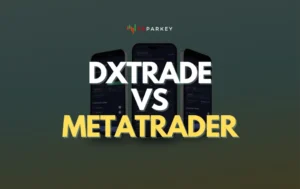You’re here because you’re weighing DX Trade vs match trader, and you want a clear, friendly breakdown of which platform truly suits your trading style.
Both claim speed, flexibility, and top-notch features, but how do they stack up in everyday use?
In this guide, I’ll walk you through each platform’s defining qualities—from basic features and fees to user experience and security. By the end, you’ll have a solid grasp of which option aligns best with your trading goals, so you can choose with confidence.
DX Trade Vs Match Trader: Quick Comparison
| Feature | Dx Trade | Match Trader |
|---|---|---|
| Ease of Use | Intuitive, beginner-friendly | Strong but can feel advanced at first |
| Customization Level | Moderate customization | High customization, including layouts |
| Charting Tools | Essential indicators, user-friendly | Extensive tools and in-depth analysis |
| Order Types | Standard (market, limit, stop) | Expansive (trailing stops, advanced OCO) |
| Mobile Experience | Clean, minimal interface | Feature-packed, slightly busier |
| Typical Fees (Broker Dep.) | Mixed spreads/commissions | Often tight spreads + per-lot commission |
| Reliability/Uptime | Generally stable, low downtime | Excellent server stability, high volume |
| Best For | New to intermediate traders | Traders who want robust, flexible tools |
Get to Know DX Trade
Dx Trade is often lauded for its straightforward interface and comprehensive toolset. It aims to make trading accessible to everyone, even if you’re stepping into the realm of online trading for the first time.
DX Trade Key Highlights
One of Dx Trade’s strengths lies in its user-friendly design. You don’t need advanced tutorials just to place a basic trade. In fact, many new traders say they appreciate how the platform clarifies essential metrics, like available margin and potential profit targets, without burying them in jargon.
Suitability for your Needs
Ask yourself, do you want a platform that keeps complexity in check? If you prefer a relatively straightforward toolset to get in and out of trades quickly, Dx Trade might be an appealing option. It’s also a go-to choice for traders who value integrated risk management features—things like margin calls and negative balance protection can be toggled to give you peace of mind when you venture beyond your comfort zone.
That said, if you’re after advanced algorithmic functions or special order types, you’ll find them, but they may not be as extensive as on some specialized platforms. So weigh your exact needs. If you like a balanced blend of ease-of-use and moderate customizability, Dx Trade could fit.
Learn About Match Trader
Match Trader positions itself as a high-performance platform that caters to both newcomers and veteran traders seeking robust charting and analytical tools. While it can feel more “technical,” that doesn’t mean you’ll get lost in a labyrinth of features.
Core Strengths of Match Trader
Speed is also a selling point. Trade execution tends to be brisk, which can be pivotal if you rely on short-term moves or scalping. Another bonus is that the interface can be customized in-depth—you can build your own shortcuts or override default settings for everything from color schemes to price alerts.
Ideal User Profiles
If you love the idea of customizing your entire workspace down to the smallest detail, Match Trader might be your new home. It’s also a good fit if your trading style involves advanced strategies or automated scripts. For those who plan to scale up or try different trading approaches over time, the platform’s flexibility truly shines.
New traders, don’t be scared off by the advanced suite of tools. You can start small with basic orders, then grow into the platform’s heavier features once you’re comfortable. However, if you prefer things to be ultra-simple all the time, you might find the learning curve a bit steeper.
Compare Key Functionalities

When looking at dx trade vs match trader, it’s helpful to zero in on each platform’s specific functionalities. After all, features and order types are among the first things you’ll encounter when placing trades or analyzing the market.
Order Types
- Dx Trade: Placing a market order is straightforward. You set your lot size, confirm, and you’re in the trade.
- Match Trader: Offers a similar process, with potentially faster execution during peak market hours.
- Dx Trade: Basic limit and stop orders come standard. You can also attach take-profit and stop-loss details.
- Match Trader: Expansive order variety, including trailing stops and advanced triggers that let you automate entry and exit more precisely.
- Dx Trade: Some brokers enable OCO functionality through Dx Trade, but it’s not always universal.
- Match Trader: Usually included, enabling you to place two connected orders so that if one triggers, the other is canceled automatically, a helpful strategy tool for breakout trading.
- Dx Trade: Includes robust charting with essential indicators (e.g., moving averages, RSI, Bollinger Bands). You can customize these, but the library might be smaller compared to specialized platforms.
- Match Trader: Known for its huge selection of technical indicators, drawing tools, and customization options. If you’re meticulous about analyzing candlestick patterns or testing advanced setups, you’ll likely appreciate the variety here.
Mobile Capabilities
Let’s face it, you might not always be at your desktop when the market moves. Both Dx Trade and Match Trader offer mobile apps that let you place orders, set alerts, and monitor positions on the go. However:
Assess Fees and Pricing

Let’s be honest, trading fees can eat into profits if you’re not mindful. While exact costs depend on your broker, it’s still worth examining how each platform handles fees or commissions.
Commission Structure
Additional Costs
Besides standard commissions and spreads, look for other potential fees:
If you’re a casual trader, you might not notice these small fees as much, but for day traders or scalpers, costs can pile up. It’s crucial to do a quick calculation of how spreads and commissions line up with your trading frequency.
Examine User Experience

User experience matters because it impacts how quickly you can open or close trades, access important data, and adapt to new market conditions. A well-designed interface can help you avoid mistakes that arise from confusion or slow navigation.
Interface design
For brand-new traders, Dx Trade’s interface simplicity can be a breath of fresh air. You can learn the ropes without extensive setup. If you want a more advanced interface with near-endless customization, Match Trader is your friend.
Customer Support
Regardless of platform, make sure your chosen broker offers the level of support you need. Some traders are comfortable with basic chat functionalities. Others want phone support or a personal account manager. The platform might not matter as much if the broker’s service is top tier.
Check Reliability and Security
Security is huge in online trading. You want to ensure your funds remain protected and your trades execute reliably, without random disconnections or data leaks.

Data Protection
Both Dx Trade and Match Trader employ encryption protocols to secure data transmissions. This typically includes SSL/TLS encryption, which scrambles info as it travels between your device and the trading servers. If you’re worried about identity theft or data hacking, both platforms aim to mitigate those risks. However, your broker also shares responsibility for overall safety.
Platform Uptime
In most cases, both platforms try to keep downtime minimal, especially during peak trading windows. If your strategy demands near-constant connectivity—think scalping or high-frequency trades—it’s worth researching your broker’s track record for server reliability.
Decide Which Trading Platform Fits You
At this point, you might be leaning one way or the other, or maybe you’re still on the fence. Let’s lay out a concise comparison to help you make that final call.
Quick Pros and Cons
Below is a summary of each platform in a bullet format that might seal the deal.
- Friendly interface for quick onboarding.
- Straightforward navigation and default layouts.
- Solid risk management features built in.
- Fewer advanced customization options.
- Some specialized order types may require extra setup.
- Less extensive charting library.
- Highly customizable workspace.
- Wide variety of order types, ideal for advanced strategies.
- Large library of technical indicators and analysis tools.
- Steeper learning curve for total beginners
- Can feel cluttered if you don’t tailor the interface
- Typically requires more initial setup time
As you can see, neither platform is “perfect,” but each appeals to a different type of trader. If you see yourself as a hands-on gearhead who loves to fine-tune every detail, Match Trader might thrill you with its possibilities. If simplicity, speed, and user-friendliness matter most, Dx Trade could be your comfy zone.
Common Queries Related to DX Trade vs Match Trader
Which Platform is easier for beginners: DX Trade or Match Trader?
DX Trade is generally more beginner-friendly, offering a straightforward interface and simple navigation, making it ideal for those new to trading.
How do the Charting and Technical Analysis tools compare between the two?
Match Trader stands out with a larger library of technical indicators and advanced charting tools, while DX Trade covers essential indicators in a more streamlined way.
What are the main differences in Order types and Automation Features?
Match Trader supports a wider variety of order types, including trailing stops and automation via scripts, whereas DX Trade focuses on basic market, limit, and stop orders.
Are there notable differences in Mobile Trading Experiences?
DX Trade’s mobile app is clean and minimal for quick trades, while Match Trader’s app offers more features and customization, which may feel busier for some users.
How do Fees and Commissions typically differ between DX Trade and Match Trader?
Both platforms’ fees depend on the broker, but DX Trade often uses fixed spreads or small commissions, while Match Trader may offer tighter spreads plus per-lot commissions.
Final Thoughts

Choosing between dx trade vs match trader can be a pivotal decision in your trading journey. You’ve got to consider how you prefer to interact with the market, what type of charting style you rely on, and the sorts of order setups you frequently use.
If you want to keep your trading environment straightforward—focusing on a solid, user-friendly structure—Dx Trade might be your top pick. On the other hand, if your ultimate goal is to dig deep into technical tools, experiment with advanced orders, or even automate aspects of your trading, Match Trader is ready to cater to your ambition.
No platform can guarantee profits, of course, but the right fit can shape your everyday trading experience for the better. Whichever option you choose, my advice is to take advantage of any demo account or trial period your broker might offer.
Practice a bit, get familiar with all the features, and see which platform inspires your best trading self. After all, this is your trading journey—feel free to set it up exactly how you like. Good luck out there, and happy trading!






